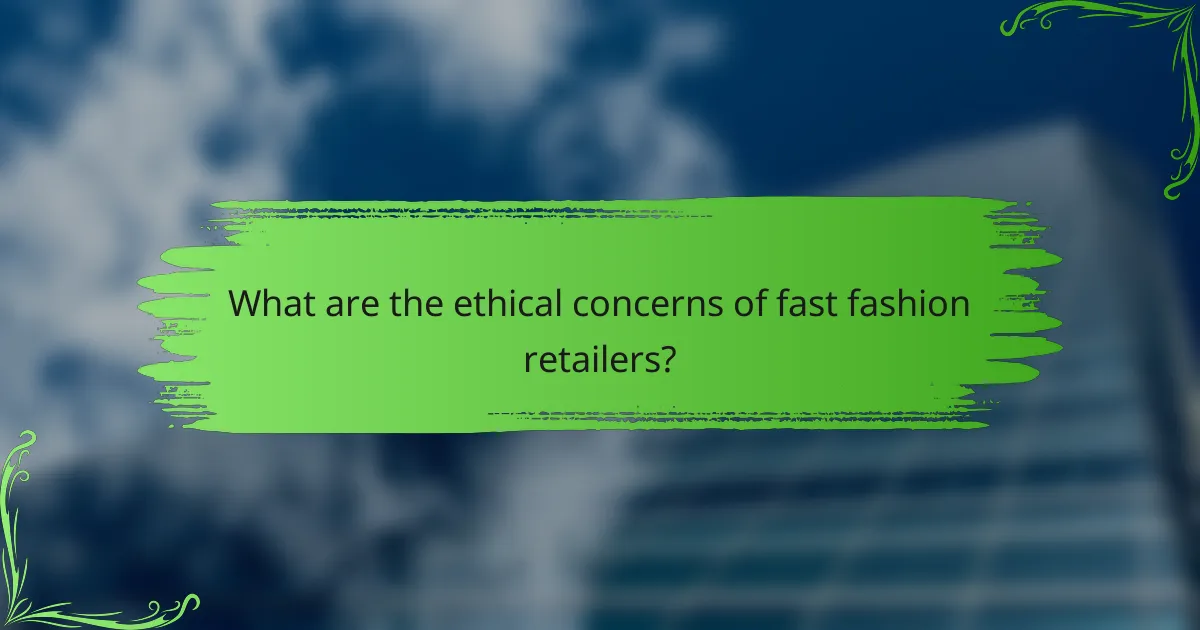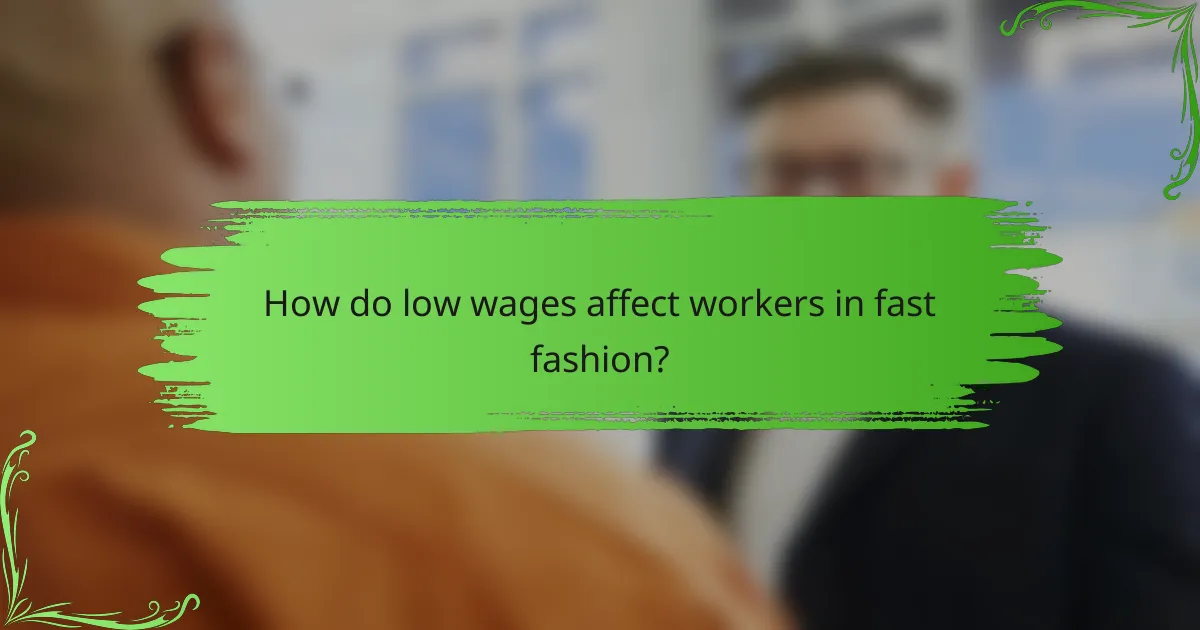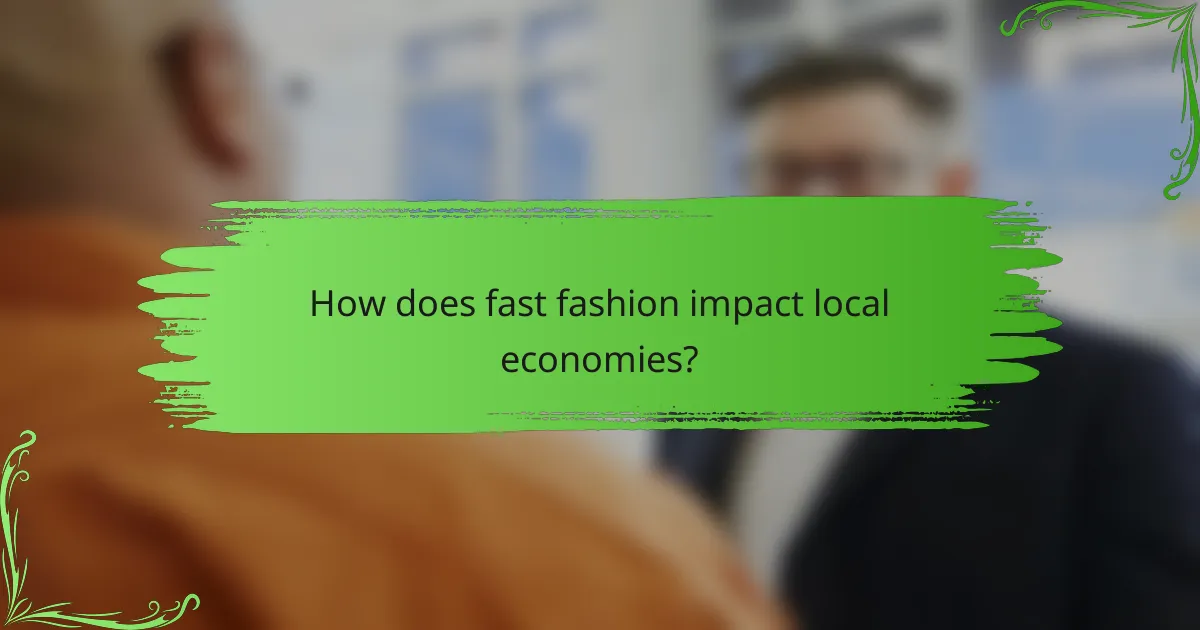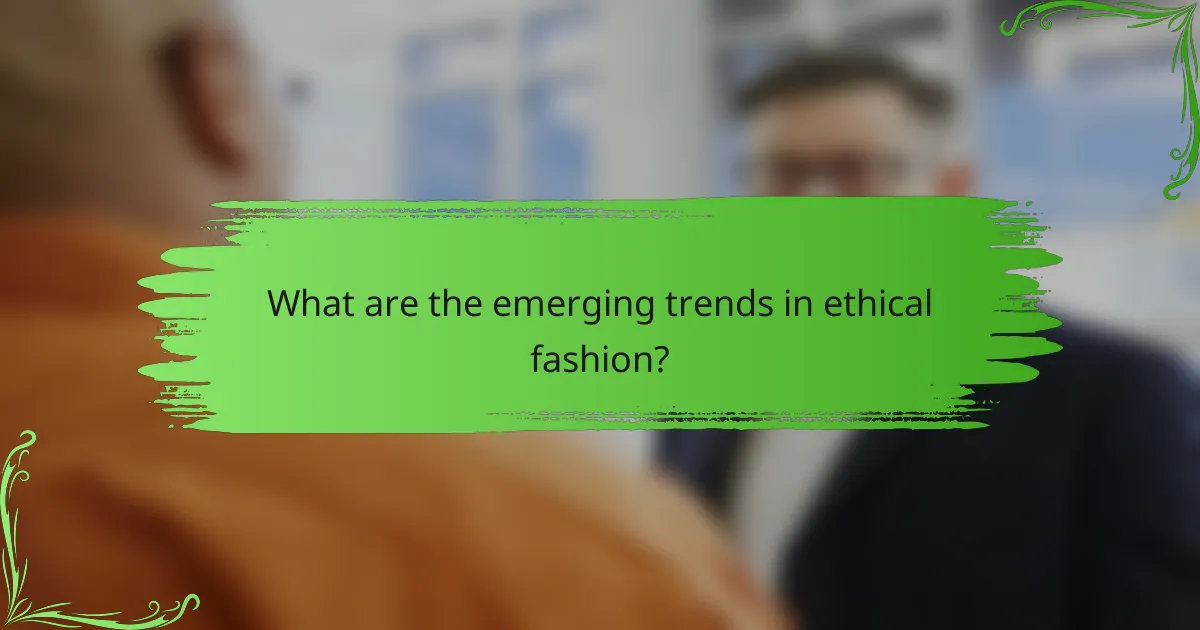Fast fashion retailers are increasingly scrutinized for their ethical implications, particularly regarding environmental harm and labor exploitation. Workers often face low wages that fail to meet basic living standards, leading to financial instability and heightened stress. Additionally, the high-pressure environments and extended hours contribute to significant job stress, resulting in employee burnout and dissatisfaction.

What are the ethical concerns of fast fashion retailers?
Fast fashion retailers raise significant ethical concerns primarily related to environmental degradation, labor exploitation, and consumer awareness. These issues stem from the rapid production cycles and low-cost strategies that prioritize profit over social and ecological responsibility.
Environmental impact
The environmental impact of fast fashion is profound, contributing to pollution, waste, and resource depletion. The industry is known for high water consumption, often using thousands of liters to produce a single garment, and generates substantial textile waste, with millions of tons ending up in landfills each year.
Additionally, the use of synthetic fibers, which are derived from petroleum, leads to microplastic pollution in oceans. Sustainable practices, such as using organic materials and recycling, are often overlooked in favor of cheaper, less environmentally friendly options.
Labor exploitation
Labor exploitation is a critical issue in the fast fashion sector, where workers often face poor working conditions, long hours, and low wages. Many garment workers, particularly in developing countries, earn less than the minimum wage, making it difficult to support themselves and their families.
Moreover, reports of unsafe working environments and lack of labor rights are common, with workers frequently subjected to harassment and intimidation. Ethical brands are increasingly advocating for fair labor practices, but many fast fashion companies still prioritize cost-cutting over worker welfare.
Consumer awareness
Consumer awareness of the ethical concerns surrounding fast fashion is growing, yet many shoppers remain uninformed about the implications of their purchases. Understanding the true cost of cheap clothing can lead consumers to make more ethical choices, such as supporting sustainable brands or buying second-hand.
To promote responsible consumption, consumers should research brands’ practices, look for certifications, and consider the longevity of their clothing. Engaging in discussions about ethical fashion can also help raise awareness and drive change within the industry.

How do low wages affect workers in fast fashion?
Low wages in the fast fashion industry significantly impact workers’ quality of life, leading to financial instability and increased stress. Many workers earn below the minimum living wage, which hampers their ability to meet basic needs and support their families.
Impact on living standards
Workers in fast fashion often struggle to afford essential items such as food, housing, and healthcare due to low wages. This financial strain can lead to poor living conditions, inadequate nutrition, and limited access to medical services. In many regions, wages may fall short of the local living wage, which is typically calculated to cover basic expenses.
For example, in countries like Bangladesh or India, garment workers may earn as little as $60 to $100 per month, while the estimated living wage could be significantly higher, creating a substantial gap. This disparity forces workers to make difficult choices, often sacrificing health and well-being for financial survival.
Worker rights violations
Low wages are often accompanied by violations of worker rights, including excessive working hours and lack of job security. Many fast fashion workers face pressure to meet demanding production targets, leading to long shifts without adequate breaks. This environment fosters a culture of exploitation, where workers fear losing their jobs if they speak out against unfair treatment.
Additionally, labor laws in many producing countries may be poorly enforced, allowing companies to bypass regulations designed to protect workers. This can result in unsafe working conditions and inadequate compensation for overtime, further exacerbating the challenges faced by low-wage workers in the industry.

What are the job stress factors in fast fashion?
Job stress in fast fashion primarily stems from high-pressure work environments and long working hours. These factors contribute significantly to employee burnout and dissatisfaction, impacting both mental and physical well-being.
High-pressure work environments
Fast fashion retailers often operate under tight deadlines, requiring employees to meet rapid production schedules. This urgency can lead to a stressful atmosphere where workers feel constant pressure to perform efficiently.
In many cases, employees are expected to multitask and adapt quickly to changing demands, which can exacerbate stress levels. The competitive nature of the industry further intensifies this pressure, as brands strive to stay ahead in a saturated market.
Long working hours
Long working hours are common in the fast fashion sector, with many employees clocking in more than the standard 40 hours per week. This can lead to fatigue and a poor work-life balance, affecting overall job satisfaction.
In some regions, workers may face mandatory overtime without adequate compensation, further compounding stress. It’s essential for employees to be aware of their rights regarding working hours and seek support if they find themselves overwhelmed by excessive demands.

How can consumers support ethical fashion?
Consumers can support ethical fashion by making informed choices that prioritize sustainability and fair labor practices. This includes selecting brands committed to ethical production, engaging in clothing swaps, and advocating for improved working conditions in the fashion industry.
Choosing sustainable brands
Selecting sustainable brands is a key way to support ethical fashion. Look for companies that use eco-friendly materials, such as organic cotton or recycled fabrics, and those that adhere to ethical labor practices. Many brands now provide transparency regarding their supply chains, making it easier for consumers to make informed decisions.
Consider checking certifications like Fair Trade or Global Organic Textile Standard (GOTS), which indicate adherence to specific environmental and labor standards. This can help you identify brands that align with your values.
Participating in clothing swaps
Clothing swaps offer a practical way to refresh your wardrobe without contributing to fast fashion. By exchanging items with friends or participating in community events, you can give new life to clothes you no longer wear while acquiring new pieces sustainably.
Organize a swap event by inviting friends and providing a space for everyone to bring their unwanted clothing. This not only promotes sustainability but also fosters a sense of community and creativity in fashion choices.
Advocating for fair labor practices
Advocating for fair labor practices involves supporting policies and initiatives that promote workers’ rights in the fashion industry. This can include signing petitions, supporting organizations that fight for labor rights, or even contacting your local representatives to express your concerns about unethical practices.
Stay informed about the brands you purchase from and encourage them to improve their labor practices. Engaging in conversations on social media and sharing information can amplify your impact and raise awareness about the importance of ethical labor in fashion.

What are the alternatives to fast fashion?
Alternatives to fast fashion include second-hand shopping and supporting slow fashion brands. These options promote sustainability, ethical labor practices, and often provide unique styles while reducing environmental impact.
Second-hand shopping
Second-hand shopping involves purchasing pre-owned clothing from thrift stores, consignment shops, or online platforms. This practice not only extends the life of garments but also reduces waste and the demand for new production.
Popular platforms for second-hand shopping include websites like eBay, Poshmark, and Depop, where you can find a wide range of styles at lower prices compared to new items. When shopping second-hand, look for quality pieces that can last, and consider checking local thrift stores for unique finds.
Slow fashion brands
Slow fashion brands focus on quality over quantity, producing clothing in smaller batches with ethical labor practices. These brands prioritize sustainable materials and fair wages, ensuring that workers are treated fairly and the environment is respected.
Examples of slow fashion brands include Everlane, Reformation, and Patagonia, which emphasize transparency in their supply chains. When choosing slow fashion, consider the longevity of the items and the brand’s commitment to ethical practices, as these factors contribute to a more sustainable wardrobe.

What are the prerequisites for ethical fashion certification?
Ethical fashion certification requires adherence to specific standards that prioritize sustainability, fair labor practices, and transparency. Brands must demonstrate responsible sourcing, fair wages, and safe working conditions to qualify for certification.
Transparency in supply chains
Transparency in supply chains is crucial for ethical fashion certification, as it ensures that consumers can trace the origin of materials and the conditions under which products are made. Brands should provide clear information about their suppliers and manufacturing processes, allowing for accountability.
To achieve transparency, companies can publish detailed supply chain maps and engage in third-party audits. This practice helps identify potential ethical issues and fosters trust with consumers who are increasingly concerned about the origins of their clothing.
Fair trade practices
Fair trade practices are essential for ethical fashion, focusing on equitable trading conditions that benefit workers and producers. This includes ensuring fair wages, safe working environments, and the right to unionize, which are vital for the well-being of garment workers.
Brands can adopt fair trade certification by partnering with organizations that uphold these principles. This not only supports workers but also appeals to consumers who prioritize ethical consumption, often leading to increased loyalty and sales.

How does fast fashion impact local economies?
Fast fashion significantly affects local economies by creating low-wage jobs while often undermining sustainable economic growth. While it can provide immediate employment opportunities, the long-term consequences include exploitation and economic instability.
Job creation vs. exploitation
Fast fashion retailers often create numerous jobs in developing countries, providing income for many workers. However, these positions frequently come with poor working conditions, long hours, and minimal pay, leading to exploitation rather than genuine economic empowerment.
For instance, workers in garment factories may earn wages that are barely above the poverty line, making it difficult for them to support their families. This imbalance raises ethical concerns about the true cost of affordable clothing.
Economic dependency on low wages
Many local economies become reliant on the fast fashion industry, which prioritizes low wages to maintain profitability. This dependency can stifle growth in other sectors and create a cycle of poverty, as workers remain trapped in low-paying jobs without opportunities for advancement.
Additionally, when global brands demand lower prices, local manufacturers may cut costs by reducing wages or compromising on safety standards. This can lead to a race to the bottom, where the focus shifts from fair compensation to mere survival in a competitive market.

What are the emerging trends in ethical fashion?
Emerging trends in ethical fashion focus on sustainability, fair labor practices, and transparency in the supply chain. Consumers are increasingly prioritizing brands that demonstrate a commitment to ethical standards, leading to a shift in how fashion retailers operate.
Increased Transparency
Brands are now providing more information about their supply chains, including sourcing materials and labor conditions. This transparency allows consumers to make informed choices and supports brands that adhere to ethical practices.
For instance, some companies publish detailed reports on their environmental impact and labor practices, helping to build trust with their customers. This trend is particularly strong in regions like Europe, where regulations around corporate responsibility are becoming more stringent.
Sustainable Materials
There is a growing emphasis on using sustainable materials such as organic cotton, recycled polyester, and innovative fabrics made from waste. These materials reduce environmental impact and appeal to eco-conscious consumers.
Brands are increasingly experimenting with alternatives like Tencel and hemp, which require less water and pesticides compared to traditional fabrics. This shift not only benefits the planet but can also enhance brand loyalty among consumers who value sustainability.
Fair Labor Practices
Ethical fashion is increasingly focused on ensuring fair wages and safe working conditions for garment workers. Brands are adopting fair trade principles and investing in worker welfare initiatives.
For example, some retailers are partnering with organizations that monitor labor conditions and provide training programs for workers. This commitment helps improve the livelihoods of those in the fashion supply chain, particularly in developing countries.
Consumer Awareness and Activism
Consumers are becoming more aware of the ethical implications of their purchases, leading to increased activism around fashion choices. Social media plays a significant role in raising awareness and promoting brands that align with ethical values.
Campaigns and movements advocating for ethical fashion encourage consumers to support brands that prioritize sustainability and fair labor. This shift in consumer behavior is prompting more retailers to adopt ethical practices to remain competitive.


